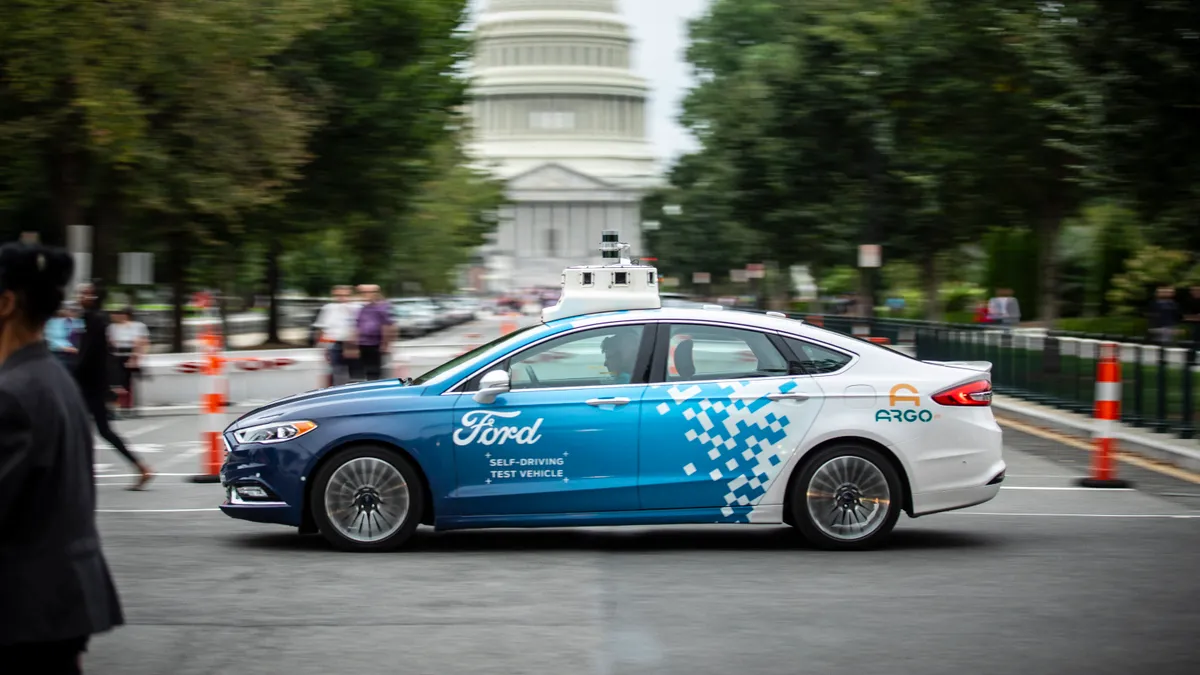Dive Brief:
- Ford CEO Jim Farley said on the company's Q4 earnings call last week that it will invest $29 billion in autonomous vehicles (AVs) and electric vehicles (EVs) through 2025, a dramatic ramp-up of its spending in those areas.
- Farley said the company will take a "more aggressive" approach toward automation and electrification, having previously pledged to spend $11.5 billion on electrification through 2022. The company's CEO said this new $22 billion commitment on electrification alone will help it be "a leader in the electric vehicle revolution around the world."
- With a slew of partnerships and other ventures, Farley said Ford is also positioning itself to have its commercial AV business in operation by 2022, thanks in large part to artificial intelligence (AI) firm Argo AI, in which Ford invested $1 billion in 2017.
Dive Insight:
Farley said Ford's moves toward further automation and electrification can improve its customer experience and its progress in areas like manufacturing, technology and its supply chain.
Ford has also made a series of investments and explored new partnerships in recent years, in a bid to evolve as a mobility company rather than a traditional automaker — and it's just one of several car companies approaching the future of mobility in this way.
At CES earlier this year, General Motors (GM) CEO Mary Barra said the auto sector is at an "inflection point" toward greater EV adoption — a sentiment that Farley echoed during the earnings call. He noted that one in 10 vehicles sold in Europe in December were "pure electric," while EV sales in China continue to grow.
"It's early in the transition, but the trend is clear," Farley said. "[The] reality is the customers, including in the US, are increasingly giving E-mobility greater consideration."
With its forays into software and technology, Farley said he believes Ford is ready to move forward into the new generation of AVs and connected vehicles. He touted the recently announced partnership with Google to make use of the company's expertise in AI, machine learning and data analysis as well as its cloud capabilities.
Meanwhile, the company has also provided transit agencies with free demand response software, consulting and planning services and partnered with Microsoft to use "quantum-inspired technology" to address traffic congestion.
Ford has been testing its AVs in cities including Austin, TX and Washington, DC, and Farley said the landscape is now "vastly different" as self-driving cars are tested increasingly on public roads, rather than being "largely in labs."
Even Ford’s micromobilty arm Spin, which it acquired in 2018 for $100 million, has experimented with automation following a recent partnership with software company Tortoise to bring teleoperated three-wheeled e-scooters to cities across North America and Europe. Spin also recently partnered with internet of things (IoT) solutions provider Drover AI to equip scooters with sensors, a camera and on-board computing power to enable real-time sidewalk or bike lane riding detection and parking validation.
Farley said Spin will "continue to grow" its network of scooters, especially as the economics improve and as that method of travel "has become more relevant in a COVID world as people explore alternative modes of transportation." A Spin spokesperson did not respond to requests for comment on what that growth may look like.
















